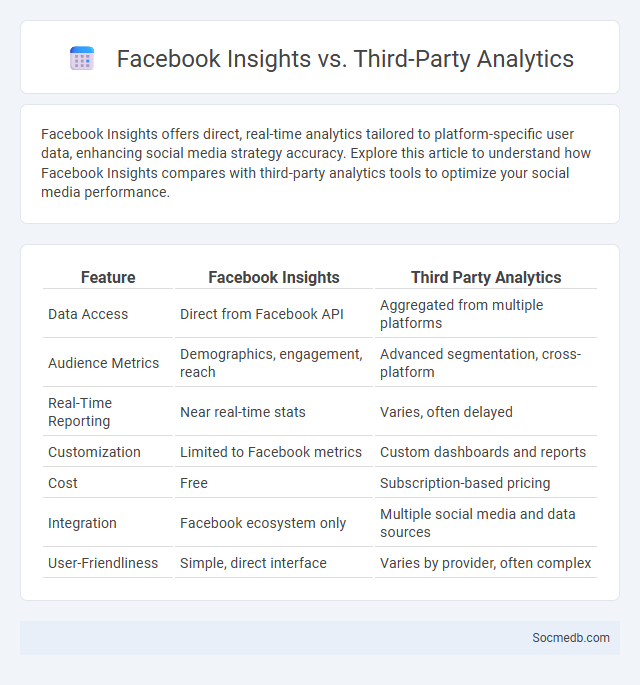
Photo illustration: Facebook Insights vs Third Party Analytics
Facebook Insights offers direct, real-time analytics tailored to platform-specific user data, enhancing social media strategy accuracy. Explore this article to understand how Facebook Insights compares with third-party analytics tools to optimize your social media performance.
Table of Comparison
| Feature | Facebook Insights | Third Party Analytics |
|---|---|---|
| Data Access | Direct from Facebook API | Aggregated from multiple platforms |
| Audience Metrics | Demographics, engagement, reach | Advanced segmentation, cross-platform |
| Real-Time Reporting | Near real-time stats | Varies, often delayed |
| Customization | Limited to Facebook metrics | Custom dashboards and reports |
| Cost | Free | Subscription-based pricing |
| Integration | Facebook ecosystem only | Multiple social media and data sources |
| User-Friendliness | Simple, direct interface | Varies by provider, often complex |
Introduction to Facebook Insights and Third-Party Analytics
Facebook Insights provides You with in-depth analytics on user engagement, post reach, and audience demographics, helping to optimize your social media strategy. Third-party analytics tools offer enhanced data visualization and multi-platform tracking, enabling a comprehensive understanding of social media performance. Leveraging both Facebook Insights and third-party analytics improves content effectiveness and fosters targeted audience growth.
Key Features of Facebook Insights
Facebook Insights offers detailed analytics on audience demographics, post reach, and user engagement, allowing you to track likes, comments, shares, and video views. You can monitor real-time data to optimize content strategy and identify peak activity times for your target audience. These key features help you make data-driven decisions to enhance your social media performance and grow your online presence.
What Are Third-Party Analytics Tools?
Third-party analytics tools are software platforms that collect and analyze data from your social media accounts to provide insights on audience behavior, engagement rates, and content performance. These tools integrate with multiple social networks, offering detailed reports that help optimize marketing strategies and increase your return on investment. By leveraging these analytics, you gain a clearer understanding of how your campaigns resonate with your target audience and identify opportunities for improvement.
Comparing Data Accuracy: Facebook Insights vs Third-Party Tools
Facebook Insights offers direct access to platform-generated data, ensuring high reliability and real-time metrics tailored to in-app activity. Third-party tools aggregate data from multiple social media channels but may face discrepancies due to API limitations and data sampling methods. Accurate interpretation of user engagement and reach depends on the specific analytics needs and the level of data granularity provided by each source.
Depth of Metrics: In-House vs External Analytics
In-house social media analytics provide granular control over data collection, enabling teams to tailor metrics specific to brand goals and customer segments. External analytics platforms offer comprehensive dashboards with benchmarking against competitors, but may lack customization and access to raw data for deep dives. Businesses balancing both approaches maximize insights by combining proprietary data depth with broad market trends and automated reporting features.
Ease of Use: Native Insights vs Third-Party Dashboards
Native social media insights provide you with direct access to real-time data and user engagement metrics, ensuring seamless integration with the platform's features. Third-party dashboards aggregate data from multiple social networks, offering comprehensive analytics but often requiring a learning curve and additional setup time. Your choice between these tools depends on whether you prioritize ease of access with native insights or a broader overview with third-party solutions.
Customization Options for Social Analytics
Social media platforms offer advanced customization options for social analytics, allowing users to tailor dashboards and reports to specific metrics such as engagement rate, audience demographics, and post performance. These customization features enable businesses to track key performance indicators (KPIs) that align with their marketing objectives, enhancing data-driven decision-making. Customizable analytics tools integrate real-time data and historical trends to provide actionable insights that optimize social media strategies.
Data Integration and Multi-Platform Reporting
Data integration in social media allows seamless aggregation of metrics from platforms like Facebook, Twitter, and Instagram, ensuring comprehensive insights. Multi-platform reporting tools enable your marketing team to visualize cross-channel performance trends, optimizing campaign strategies effectively. These capabilities empower you to make data-driven decisions with unified analytics dashboards tailored to diverse social media ecosystems.
Privacy, Security, and Data Ownership Concerns
Social media platforms often collect vast amounts of personal information, raising significant privacy concerns as users may unknowingly share data accessible to third parties. Security vulnerabilities, including unauthorized access and data breaches, put sensitive information at risk, highlighting the need for robust encryption and multi-factor authentication. Data ownership remains ambiguous, with many platforms retaining control over user-generated content, underscoring the importance of clear policies and user rights to manage personal data effectively.
Choosing the Right Analytics Tool for Your Social Strategy
Selecting the right social media analytics tool hinges on aligning features with your specific marketing goals, such as audience engagement, content performance, or competitor analysis. Tools like Sprout Social, Hootsuite Insights, and Google Analytics offer diverse metrics including reach, impressions, and sentiment analysis to optimize your content strategy. Effective data-driven decisions rely on real-time reporting, customizable dashboards, and integration with multiple platforms for comprehensive social strategy enhancement.
 socmedb.com
socmedb.com